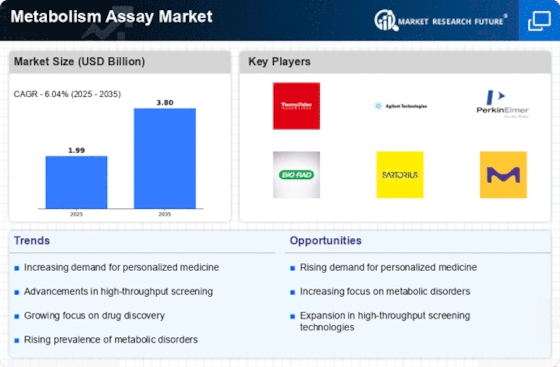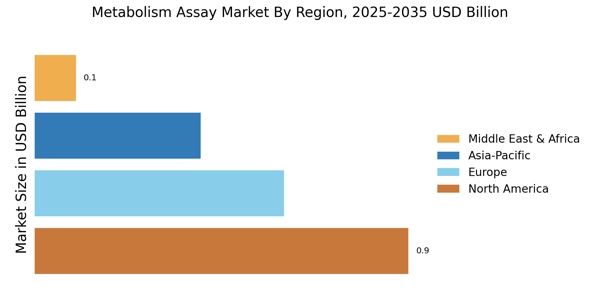Focus on Personalized Medicine
The increasing emphasis on personalized medicine is a pivotal driver for the Metabolism Assay Market. As healthcare shifts towards tailored treatment plans, metabolic assays play a crucial role in understanding individual responses to therapies. This trend is underscored by the growing demand for precision medicine, which is anticipated to reach a market value of over 100 billion dollars by 2026. Metabolic assays enable healthcare providers to assess metabolic profiles, thereby facilitating the customization of drug therapies based on individual metabolic responses. This shift not only enhances treatment efficacy but also minimizes adverse effects, aligning with the broader goals of personalized healthcare. Consequently, the Metabolism Assay Market is likely to witness sustained growth as more healthcare institutions adopt these assays to improve patient outcomes.
Rising Incidence of Metabolic Disorders
The rising incidence of metabolic disorders is significantly influencing the Metabolism Assay Market. Conditions such as obesity, diabetes, and cardiovascular diseases are becoming increasingly prevalent, necessitating the development of effective diagnostic and therapeutic strategies. Recent statistics indicate that metabolic disorders affect over 30% of the adult population in many regions, leading to a heightened demand for metabolic assays. These assays are essential for early detection and monitoring of metabolic conditions, thereby driving their adoption in clinical settings. As healthcare systems strive to manage the growing burden of metabolic diseases, the Metabolism Assay Market is poised for expansion, with an increasing number of research initiatives focused on developing novel assays to address these challenges.
Regulatory Support and Funding Initiatives
Regulatory support and funding initiatives are emerging as critical drivers for the Metabolism Assay Market. Governments and regulatory bodies are increasingly recognizing the importance of metabolic research in addressing public health challenges. Initiatives aimed at funding research projects and providing grants for assay development are becoming more prevalent. For instance, various health organizations are allocating resources to support studies that explore metabolic disorders and their treatments. This financial backing not only encourages innovation but also facilitates collaboration between academic institutions and industry players. As a result, the Metabolism Assay Market is likely to benefit from enhanced research capabilities and accelerated development timelines, ultimately leading to a more robust market.
Increased Research and Development Activities
The Metabolism Assay Market is bolstered by increased research and development activities across various sectors, including pharmaceuticals and biotechnology. The push for innovative drug discovery and development has led to a greater focus on understanding metabolic pathways and their implications in disease. Investment in R&D is projected to rise, with pharmaceutical companies allocating significant budgets towards metabolic research. This trend is reflected in the growing number of publications and patents related to metabolic assays, indicating a vibrant research landscape. As researchers seek to unravel the complexities of metabolism, the demand for advanced metabolic assays is likely to escalate, further propelling the growth of the Metabolism Assay Market.
Technological Advancements in Assay Development
The Metabolism Assay Market is experiencing a surge in technological advancements that enhance the accuracy and efficiency of metabolic assays. Innovations such as high-throughput screening and automated liquid handling systems are streamlining the assay process, allowing for faster and more reliable results. According to recent data, the market for automated systems is projected to grow at a compound annual growth rate of 8.5% over the next five years. These advancements not only improve the throughput of metabolic assays but also reduce human error, thereby increasing the reliability of results. Furthermore, the integration of artificial intelligence and machine learning in data analysis is expected to revolutionize the interpretation of metabolic data, making it more accessible for researchers and clinicians alike. This trend indicates a promising future for the Metabolism Assay Market.

















